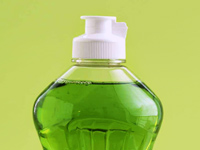Do 'Green' Cleaners Work?
Many can disinfect as well as clean
Myth: Natural cleaning products don't kill germs and therefore are ineffective.
See also: Toxin-free pesticides.
Facts: Some "green" cleaners, such as the Clorox Green Works line made from a component found in coconuts, do little more than help remove dirt. They don't disinfect — nor do they claim to — so they don't kill germs. But many other natural cleaners, both those you can make at home and those you can buy at the store, can disinfect as well as clean, says hygiene expert Donna Duberg, assistant professor of clinical laboratory science at Saint Louis University. And they do it without exposing you and your family to harsh chemicals found in commercial cleaning products that can irritate your skin, eyes and lungs.
For example, simple and inexpensive white vinegar is very effective at killing E. coli, salmonella and shigella bacteria, says Duberg. "It's good for nearly everything — from soaking the vegetables to washing the floors," she says. "Mix it with enough baking soda to make a paste and you'll get the scum out of your bathroom."
Karyn Siegel-Maier, author of The Naturally Clean Home, suggests making your own disinfectants by combining vinegar with essential oils such as rosemary, thyme or basil. In studies, basil oils have been shown to kill E. coli, listeria and salmonella bacteria. Siegel-Maier also recommends using tea tree oil, a natural mold killer. She cleans her kitchen with a homemade cleaner made from Castile soap, a little water and 15 or 20 drops of basil or rosemary oil. Seventh Generation's line of green cleaning products uses a thyme extract called thymol to disinfect.

